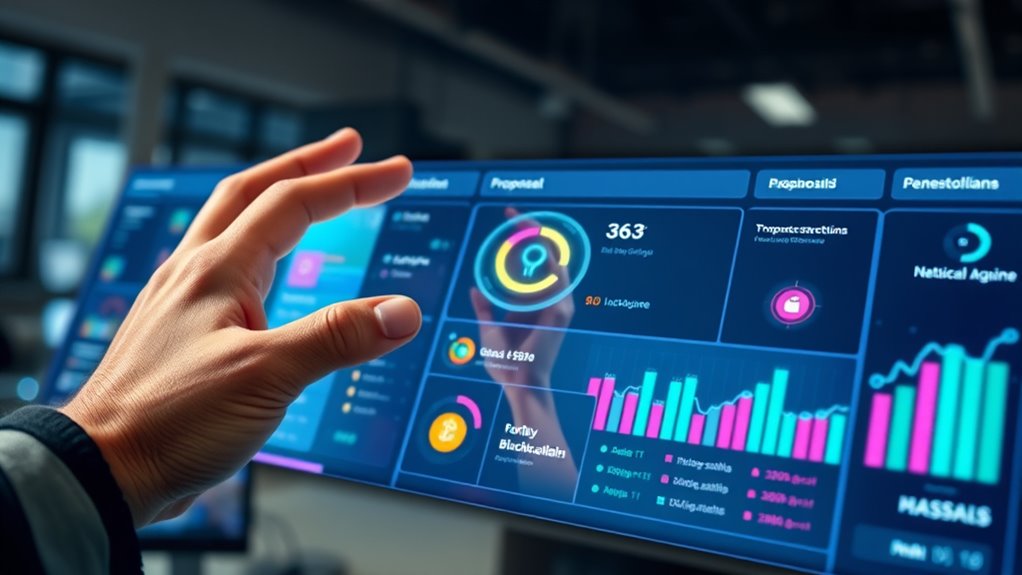To participate in your first DAO vote, start by acquiring the native tokens, which represent your voting stake. Connect your digital wallet to the DAO’s platform to verify ownership and access proposals. Review and, if you’re ready, create or debate proposals with the community. Then, cast your vote using your tokens. Voting results are transparent on the blockchain. Follow along to discover more details about transforming your stake into real community influence.
Key Takeaways
- Connect your digital wallet to the DAO platform to verify token ownership and enable participation.
- Acquire DAO tokens through purchase, airdrop, or rewards, which grant voting rights.
- Browse or create proposals, then review their details before voting.
- Use your tokens to cast votes for or against proposals, or delegate voting rights if available.
- Track voting results on the blockchain, ensuring transparency and understanding of proposal outcomes.

If you’re new to decentralized autonomous organizations (DAOs), voting might seem intimidating at first. The idea of participating in decision-making across a digital community can feel overwhelming, especially when you’re just getting started. But understanding the basics of how to move from holding tokens to casting a vote is essential for meaningful community engagement. Your journey begins with recognizing that DAOs operate through a specific governance structure designed to empower members like you. This structure outlines how proposals are made, debated, and ultimately decided upon, guaranteeing transparency and collective control. Once you’re familiar with this framework, participating becomes less intimidating and more impactful.
Getting started with DAOs: from holding tokens to active voting in a transparent, community-driven governance structure.
The first step is acquiring the DAO’s native tokens, which serve as your voting power. These tokens are usually distributed through sales, airdrops, or rewards, and they symbolize your stake in the organization. Holding tokens not only grants you voting rights but also aligns your interests with the DAO’s success. When you’re ready to engage, you’ll need to connect your digital wallet to the DAO’s platform, which is often hosted on blockchain networks like Ethereum. This connection allows you to interact securely and verify your ownership of tokens, making your participation legitimate within the governance structure.
Once you’ve connected your wallet, you’ll see the list of active proposals or the options to create your own. Community engagement is key here—reading proposals thoroughly, asking questions, and discussing with other members helps you understand the potential impact of each decision. As part of the governance process, proposals often go through a review period where members can comment and suggest modifications. This collaborative approach ensures that community voices are heard and considered before a vote takes place. When you decide to support a proposal, you simply cast your vote—either for or against—using your tokens as your voting power. Some DAOs also offer mechanisms for delegation, allowing you to entrust your vote to someone you trust if you’re unsure about a particular proposal.
After voting concludes, results are automatically tallied on the blockchain, guaranteeing transparency and trustworthiness. If the proposal passes, it moves into implementation, and you can track its progress within the community. Engaging in this process deepens your connection to the DAO and helps shape its future. Remember, the governance structure is designed to be inclusive and participatory, so your voice matters. By understanding how to move from holding tokens to actively voting on proposals, you become an integral part of a decentralized community that operates on collective decision-making. Your participation not only influences the organization’s direction but also fosters a stronger, more engaged community where everyone’s input counts.
Frequently Asked Questions
How Do I Acquire DAO Tokens Securely?
To acquire DAO tokens securely, start by setting up a reputable wallet with strong security features like two-factor authentication. Always buy tokens from trusted exchanges to guarantee token security and avoid scams. Transfer your tokens directly to your wallet, keeping your private keys private. Double-check wallet addresses before sending, and consider hardware wallets for added protection. This way, you safeguard your tokens while participating confidently in the DAO ecosystem.
What Are Common Mistakes to Avoid During Voting?
When voting, avoid common mistakes that compromise voting transparency and decision transparency. Don’t rush your choice; take time to review the proposal details thoroughly. Be cautious of voting based on rumors or incomplete info, as this undermines transparency. Also, double-check that your vote is recorded correctly before the deadline. By staying informed and vigilant, you help guarantee a transparent and fair decision-making process within the DAO.
Can I Change My Vote After Submitting It?
You might wonder if you can change your vote after submitting it. Generally, DAO platforms offer some voting flexibility, allowing you to modify your vote before the voting deadline. Check the specific rules of the platform you’re using because vote modification policies vary. Keep in mind that once the voting period ends, your vote is usually final. So, act promptly if you want to update your decision.
How Are Proposals Prioritized Within the DAO?
You might wonder how proposals are prioritized within the DAO. Typically, the process involves proposal evaluation and adherence to voting criteria. Proposals that align closely with the DAO’s goals, demonstrate community support, and meet specific evaluation standards tend to rank higher. Voting weight, stakeholder influence, and urgency also play roles. By understanding these factors, you can better grasp how the DAO determines which proposals move forward first.
What Happens if a Proposal Fails to Pass?
When a proposal fails to pass, you face proposal rejection and must understand the failure consequences. Typically, the proposal is rejected, meaning it won’t be implemented or funded, and you might need to revise and submit it again. Failure consequences can include loss of credibility or delays in your project. You should review feedback, adjust your proposal accordingly, and consider re-submitting or engaging with the community for support.
Conclusion
Now that you’ve completed your first DAO vote, you’re more confident steering the process. Remember, each vote helps shape the community and its projects. Stay engaged, ask questions, and continue learning to make informed decisions. Your participation makes a difference, so don’t hesitate to get involved in future proposals. Keep exploring, and over time, you’ll become a seasoned voter, contributing meaningfully to your DAO’s growth and success.








